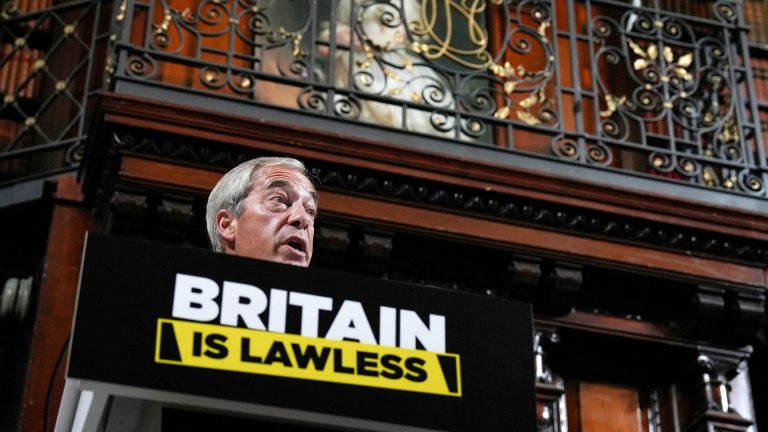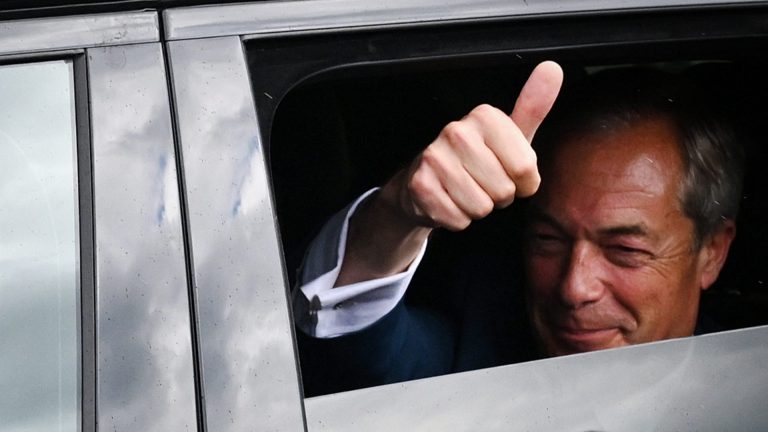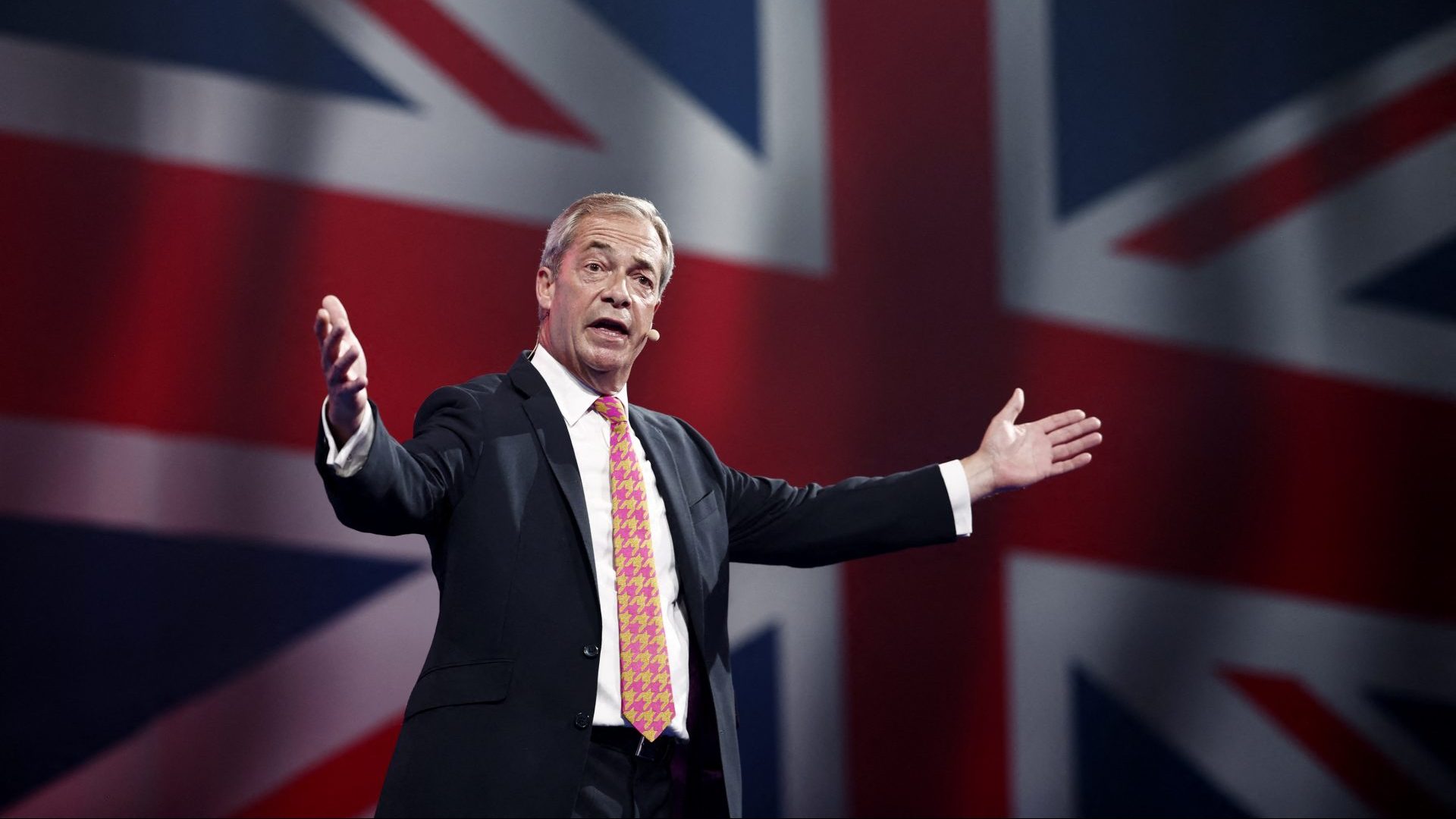“There’s not going to be a President Donald Trump”: whenever I am assured that there is no way Nigel Farage could become prime minister, I remember George Clooney’s words of reassurance at the Cannes Film Festival in May 2016.
On which note: who was this idiot, writing in the New York Times in March 2014? “This is Mr Farage’s moment, but it will pass.” Yes, indeed. Yours truly. Not one of my wiser assessments.
What amazes me is that there are still so many progressives who, with varying degrees of confidence, believe that some cosmic law will obligingly intervene to prevent the Reform UK leader making it to Downing Street.
Back in October 2023, I wrote in these pages: “Could he become prime minister? Do not confuse your horror at such a prospect with an objective evaluation of its probability. It is now – shockingly – an outcome that is comfortably within the realms of the plausible.”
At the time, Farage was not yet leader of the party, not yet an MP, not yet consistently ahead in the opinion polls (more than 60 in a row, if you’re counting). So the suggestion that he might conceivably become PM was still, as they say, a “thought experiment”.
Now Farage is the bookies’ favourite to succeed Keir Starmer. Again, nothing makes this inevitable. But nothing will inevitably prevent it, either.
And you can see that the Reform leader himself is starting to believe that it might just happen.
Launched last Monday, his six-week law and order campaign offers a chilling insight into how he intends to compete for power and what he might do with it if he succeeds. As the months pass, we see more of what the jagged contours of Farage’s Britain would look like.
With a few tweaks, he has simply imported the MAGA playbook on crime and immigration. To provide more capacity for prisoners, he promises to build “Nightingale prisons”, reminiscent of the pop-up Nightingale hospitals constructed at pace during the pandemic. He pledges to recruit 30,000 more police officers, and to ensure that they are “physically tougher”. He undertakes to crack down on lesser crimes such as shoplifting and phone theft.
He would, for starters, deport 10,000 foreign offenders. And, in a brazen borrowing of Donald Trump’s methods, declares himself open to imprisoning British convicts in El Salvador: “If that means that [Soham murderer] Ian Huntley goes to El Salvador, well, our attitude is – so be it.”
Reform is even referring in the plural to its “Lucy Connollys” – a reference to the Northampton childminder jailed for 31 months for inciting race hate online last July in the wake of the Southport killings. Such convicts are clearly going to be the party’s counterpart to the J6 rioters in Washington: supposed patriots, falsely condemned by the liberal establishment.
At the launch of the campaign, Farage presented himself simultaneously as the man who would bring order to the nation and as the tribune of those who have been breaching the peace near hotels housing asylum seekers. “I don’t think anybody in London even understands just how close we are to civil disobedience on a vast scale in this country,” he said. “Of course, there were some bad eggs that turned up at Epping… But do I understand how people in Epping feel? You bet your life I do.”
In his reference to “Antifa” trouble-causers – another imported Americanism, referring to anti-fascist activists – he channelled Trump’s infamous response to the Charlottesville race riots in 2017. And, in his expression of sympathy for the “people in Epping”, he gave his blessing to the rage that is coursing dangerously through the towns and cities of the nation.
It was especially significant that Farage was flanked at the event by two of his senior female colleagues: Sarah Pochin, Reform MP for Runcorn and Helsby, and Laila Cunningham, a Westminster city councillor, former prosecutor, moderate Muslim and mother of seven.
Reform has suffered from its image as a boys’ club; most egregiously in the case of James McMurdock, MP for South Basildon and East Thurrock, who did time in a young offender institution for assaulting his then girlfriend and has since lost the party whip over separate allegations that he improperly benefited from Covid loans.
Witness, in sharp contrast, the increasing prominence of Pochin, Cunningham, Andrea Jenkyns (mayor of Greater Lincolnshire) and the newly defected Laura Anne Jones, the party’s first Senedd member. As its ambitions soar, Reform is seeking to banish its image as the party of grumpy old saloon-bar dwellers and male chauvinist pigs (the work of more than one press conference, it must be said). But – beyond the obvious need to be seen as more than a protest group for white, middle-aged reactionaries – there is a very specific reason for this strategic shift.
Though he made his name as the arch-Brexiteer, Farage has always been much more interested in culture wars than constitutional argument. And now he is connecting his lifelong fixation with immigration explicitly to the anxiety about violence against women and girls that is felt by people who would not otherwise listen to a word he says.
The unrest outside the Bell Hotel in Epping was triggered by the arrest on July 8 of Hadush Kebatu, 41, from Ethiopia, who had only arrived in this country eight days before, after he had allegedly propositioned a teenage girl. He denies three charges of sexual assault and has been remanded into custody.
On last Thursday’s Newsnight, Paddy O’Connell interviewed three young women in the Essex town. One, with the blue hair stereotypically associated with social justice movements, said: “I felt like it was a safe place and now it is not. We are just scared about the people, the illegal immigrants, coming here and we don’t even know who they are and we are just scared.”
Farage’s barely concealed objective is to stir up such emotions across as much of the country as he can, while simultaneously posturing as the only party leader who can quell the violence and drain the poison from the political bloodstream. It is a tactic of breathtaking hypocrisy. It is also proving alarmingly effective.
Which is why it is so essential that progressives get their act together. It is nice to know that Angela Rayner flagged up the poor state of social cohesion at last Tuesday’s cabinet meeting. “Why are people unhappy with, say, the asylum system?” asked Jonathan Reynolds, the business secretary, on Thursday. “Are they reasonable? Are they upset for legitimate reasons? Yes, we share those as a government. That is why we are sorting it out.”
To be fair, the government is trying to end the accommodation of asylum seekers in hotels and hostels, though not quickly enough. But, in most other relevant respects, it seems to be frozen in the headlights. On May 12, Starmer deployed the shameful phrase “island of strangers” – and then, rightly, apologised in an interview with his biographer, Tom Baldwin. But where does that leave him?
It took a review by the fearless Louise Casey to persuade the PM to announce a statutory national inquiry into the grooming gang scandal – after he had previously condemned those who proposed such an investigation for “jumping on the bandwagon”.
I would also like to know why this government has done nothing to help the teacher from Batley Grammar School in West Yorkshire who is still in hiding more than four years after his lessons upset a group of Muslim parents. The impression, formed increasingly across the country, is that Starmer will only address such issues when absolutely forced to.
Suggested Reading


Nigel Farage, judge dreadful
Progressives are sleepless weavers of consoling myths – never more so than where the rise of Farage is concerned. The first myth is that Reform UK will necessarily crumble under the weight of heavier media scrutiny. Certainly, the party’s costings – such as they are – will be assessed with greater seriousness. But it is essential, if dispiriting, to acknowledge what I have called “asymmetry of criteria”.
In the populist era, when trust in politics is in the gutter, not all parties are judged in the same way. For example: it is not the lunacy of his tariff strategy or the unconstitutional horror of his deportation programme that is causing Trump the first real problems of his second presidency. It is the furore over the Jeffrey Epstein scandal that truly exercises the MAGA base.
In the same way, I do not think that Farage will be toppled by the power of data viz or detailed analysis of his (doubtless nonsensical) plans for the NHS and social care. His appeal has nothing to do with hope for the future. It is entirely entangled with rage at the present. His popularity reflects not a surge of public expectations but precisely the extent to which they have been dashed by successive governments.
Second: it is a complete misunderstanding of modern politics to make the basis of your strategy the assumption that steady “delivery” will inexorably generate a reversal of Labour’s fortunes.
Every minister and government adviser should read (if they haven’t already) The Death of “Deliverism”, a seminal 2023 essay by Deepak Bhargava, Shahrzad Shams and Harry Hanbury, which warned that “progressive policymaking must take identity, emotion, and story much more seriously”; that “economic realities are mediated by identity”; and that “policies that deliver economic benefit without speaking to, reinforcing, and constructing a social identity are likely to have little political impact”.
The Democratic establishment did not absorb any of this, which was one of many reasons for Trump’s victory in November. Labour would do well not to make the same mistake; not to assume that economic recovery would automatically translate into political resurrection. A nation is not a courtroom, and Starmer should behave like a PM rather than a KC. Political success is governed by emotions, not evidence or statistics (ask any veteran of the 2016 Remain campaign).
I do wonder if those who dominate the progressive world – not only the Labour Party, but publishing, the liberal media, the highest ranks of the public services and higher education – are as worried as they should be. In their most private moments, do all too many of them perhaps reflect that, one way or another… they will be all right?
Once the party of the workers, Labour is now culturally aligned with middle-class graduates; many of whom practise, in the phrase of the US commentator, Robert Reich, the “politics of secession”. They espouse socially correct causes. But their children go to private or church schools. A lot of them have private healthcare and healthy pension pots. They are living in properties worth exponentially more than when they bought them. Some of them have a second home. They will be all right.
As Nassim Nicholas Taleb warns in his book, Skin in the Game: Hidden Asymmetries in Daily Life (2017): “Do not pay attention to what people say, only what they do, and to how much of their necks they are putting on the line.” Too often, elites are “delusional… simply because they never have to pay for the consequences of their actions”.
How easy is it for most of those in positions of power to imagine what it is like to have a hostel of young male asylum seekers in your neighbourhood? How many ministers or permanent secretaries send their children to schools where 20 or more languages are spoken?
Here is at least a part of the answer: not to offer a dilute version of Farage’s nativism but truly to address the problems that he is merely exploiting, at street-level and in person. In this respect, Jess Phillips, now a minister, offered an object lesson in 2019 with her handling of confrontations with mostly Muslim parents outside Anderton Park Primary School in Birmingham over LGBT-inclusive lessons to children (accessible on YouTube).
Suggested Reading


The car-crash cost of Farageonomics
“I don’t agree that you get to pick and choose which equalities you can and can’t have,” she told protesters. “Our equality law protects us all… It’s not Islamophobic to think that people can have two mums. How’s that Islamophobic?”
What made the moment so powerful was its unmediated humanity. So, I ask this: why is Starmer not heading for one of the protest sites – Epping, Diss, Canary Wharf – and confronting the problem himself? True leadership means hugging the cactus. It means listening in person.
And then it means having the courage to speak the truth, face to face: which, in this case, is that mistakes have been made; that immigration and the admission of refugees will continue, as in all modern, interdependent nations, but that it must, indeed, go hand in hand with integration; that, as PM, he will heed the concerns of all law-abiding citizens; that their voices are not, as they fear, unheeded; and that he is emphatically on the case, and not a timid, technocratic irrelevance to their lives.
Strategy papers and statistics won’t ever beat Farage. If Labour wants a second term, its most senior figures must, quite literally, take to the streets.




